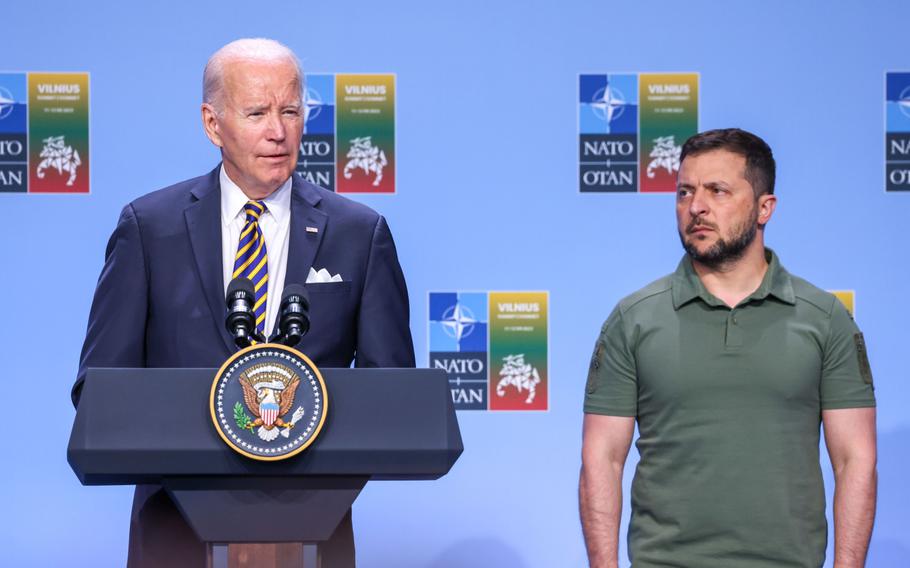
President Joe Biden and Ukrainian President Volodymyr Zelenskiy on the closing day of the NATO summit in Vilnius, Lithuania, on July 12. (Andrey Rudakov/Bloomberg)
President Joe Biden said the fate of democracy would be determined by decisions made by the U.S. and its allies in the coming years, as he championed diplomatic breakthroughs at this week's NATO summit and sought to implicitly bolster his reelection prospects.
"The defense of freedom is not the work of a day or a year. It is the calling of our lifetime," Biden said Wednesday in a speech capping a two-day meeting of leaders from the military alliance.
The summit proved a test of Biden's devotion to diplomatic engagement. Before leaders arrived, Turkey suggested it wouldn't move forward with Sweden's application to join the alliance if its own bid to join the European Union wasn't accepted. And Ukrainian President Volodymyr Zelenskiy sent shockwaves through the gathering when he tweeted that intentionally vague compromise language surrounding Ukraine's own NATO bid was "unprecedented and absurd."
But by the time Biden took the stage at Vilnius University, to an estimated crowd of nearly 10,000 cheering Lithuanians and pumping music, he was able to champion an agreement brokered between Turkey and Sweden that will see the addition of the alliance's 32nd member. Zelenskiy, for his part, backtracked from his harsh criticism, thanking Biden in a meeting hours earlier for brokering new security guarantees from Group of Seven nations and labeling the summit a "success."
As Biden heralded those accomplishments in a 20-minute speech to an outdoor audience that waved Lithuanian, Ukrainian and U.S. flags, his argument appeared directed more toward Americans at home.
"We face a choice, a choice between a world defined by coercion and exploitation, where might makes right or where we recognize that our own success is bound to the success of others," he said.
"We understand that the challenges we face today - from the existential threat of climate change, to building a global economy where no one gets left behind - are too great for any one nation to solve on their own," said Biden. "And that, to achieve our goals and meet the challenges in this age we have to work together."
The success of his reelection bid will largely hinge on the state of the economy, with U.S. voters battered by recession fears. Biden though focused on the global challenges to the U.S. and democracy on Wednesday, seeking to present himself as a steady and experienced foreign policy hand, even as voters express doubts about his health and fitness to serve a second term.
Biden has made protecting democracy a centerpiece of his presidency and reelection, repeatedly highlighting what he says are ongoing threats to free and fair elections in the U.S. from his predecessor Donald Trump and the former president's supporters. And he has touted NATO's unity behind Kyiv as a major accomplishment to protect democracy abroad, working to resolve differences among allies as Russia's invasion nears the 18-month mark and the humanitarian and economic impacts of the war grow.
Bloomberg's Jenny Leonard contributed to this report.